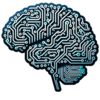
Back Etiek van kunsmatige intelligensie Afrikaans أخلاقيات الذكاء الاصطناعي Arabic Süni intellekt etikası Azerbaijani Ètica de la intel·ligència artificial Catalan Ethik der Künstlichen Intelligenz German Ηθική της τεχνητής νοημοσύνης Greek Ética en la inteligencia artificial Spanish اخلاق هوش مصنوعی Persian Tekoälyn etiikka Finnish Éthique de l'intelligence artificielle French
| Part of a series on |
| Artificial intelligence |
|---|
The ethics of artificial intelligence covers a broad range of topics within the field that are considered to have particular ethical stakes.[1] This includes algorithmic biases, fairness, automated decision-making, accountability, privacy, and regulation. It also covers various emerging or potential future challenges such as machine ethics (how to make machines that behave ethically), lethal autonomous weapon systems, arms race dynamics, AI safety and alignment, technological unemployment, AI-enabled misinformation, how to treat certain AI systems if they have a moral status (AI welfare and rights), artificial superintelligence and existential risks.[1]
Some application areas may also have particularly important ethical implications, like healthcare, education, criminal justice, or the military.
- ^ a b Müller VC (April 30, 2020). "Ethics of Artificial Intelligence and Robotics". Stanford Encyclopedia of Philosophy. Archived from the original on 10 October 2020.
